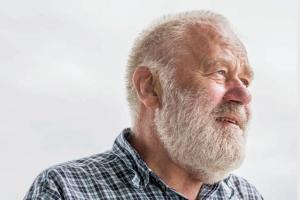
Before Henry Vlug graduated from law school in 1985, no Deaf person had graduated from a law school in Canada. When he attained his degree from the University of British Columbia, not only did Henry Vlug become the first Deaf graduate of a law school in Canada, but would go on to become the first Deaf practicing lawyer in Canada. It was an achievement he almost didn't attain, but once he did, there was no stopping Henry Vlug.
It was the implementation of The Canadian Charter of Rights and Freedoms in 1982 that challenged Vlug to apply to law school. "I took a look at that and said, 'I'll believe it when I see it'" reflects Vlug, for whom an application to law school was itself a test of The Charter's promises of equality.
Vlug immigrated to Powell River, BC with his family at the age of 8, in 1952, and contracted tubercular meningitis that same year, which led to his loss of hearing. Originally educated as a biologist and then a teacher, Vlug worked to educate other Deaf students. "As a former teacher before he became a lawyer, he has encouraged so many of us in ways that only a teacher knows," says James Roots, Executive Director of the Canadian Association of the Deaf (CAD).
Prior to law school, Vlug had a reputation as an advocate for those with disabilities. He fought for the Deaf's right to access the telephone, arguing against the Telecommunications Commission and Canadian Radio-television at the BC Human Rights Tribunal in 1982. When the provincial government cut funding for interpreters at UBC in 1984, it jeopardized Vlug's legal education, as well as the degree aspirations of two other Deaf UBC students. Vlug rallied students and called in the media, but when that only prompted UBC to provide support up to the bachelor level, he represented counseling psychology graduate student Nigel Howard in a human rights complaint. "All universities now provide interpreters because of the decision," explains Vlug, highlighting the importance of the Howard decision.
As an advocate with a string of successful results, Vlug still had difficulty securing a job after articles. "No one showed any interest," says Vlug, who started his own firm as a result. He had to do whatever work anyone would pay for, but Vlug still preferred "something that would have an impact...it [criminal stuff] wasn't going to change the world, but human rights, it did." Vlug continued to fight for human rights, playing a behind-the-scenes role in cases for sign language interpreters for medical patients ( Eldridge v. British Columbia ) and against he Canadian Broadcasting Corporation (CBC) for failing to provide full closed captioning of its programs. Vlug himself asked the CRTC how many complaints he's filed over the years, and found out the number is close to 400.
While changing the law is a significant accomplishment, Vlug can also boast of changing perceptions about people with disabilities and inspiring others. His colleague Terry La Liberté says of Vlug's proficiency, "I watched Vlug cross-examine as effectively, if not better, than a lot of people that I've seen." Allard graduate Susan Van der Flier (LLB '91) has twin Deaf sons, and believes Vlug is an inspiration for them "I think knowing there is a lawyer in the Deaf community, gives the Deaf community a different kind of power when they're seeking answers to things."
In recognition of his work, Vlug was awarded the Queen's Counsel designation in 2004. However, it is the results of his work that Vlug holds most dear, saying "I was making an impact, making change...I think it was valuable."
Henry Vlug, QC was profiled for the Fall 2016 edition of the Peter A Allard School of Law Alumni Magazine.
First published on May 23, 2017.